Resilience has now become the most crucial agenda for every company across the IT industry. During a year and a half of the black swan event that shook the world, digital transformation took center stage to help businesses navigate the pandemic reality. To ensure business continuity, more than 90% of the workforce at major technology companies have embraced radical virtual collaboration. As companies plan their next move, what will be essential for them to thrive in the next normal? We at Netscribes believe that to stand out and succeed, IT companies will not only have to make bolder decisions, but they will also need to make them faster.
So when chief economists suggest that we’re extremely likely to witness a high growth rate – a v-shaped recovery whether it’s a boom or not – it’s an indication for IT leaders to look at the optimistic future that they can create for their businesses in the post-pandemic economy.
2022 is at the doorstep. To continue to do what the IT sector has historically done best – innovate and grow – it must consider these five growth opportunities in the post-COVID-19 era:
1. Blockchain-as-a-Service: Creating decentralized and scalable IT infrastructure
In early September this year, Google announced its collaboration with Dapper Labs to host the Flow blockchain nodes. This step is part of Google’s strategy to provide hosting for public blockchains. Moreover, this will enable its developers to access nodes on Flow more efficiently and seamlessly.
Blockchain is about 80% business process change and 20% technology implementation. In other words, it represents a total shift from the traditional ways of doing things. This stands true for IT companies that have already seen a significant transformation from digital technologies. Between 2017 and 2020, blockchain skills became one of the most sought-after proficiencies in the world with the demand increasing by almost 2000%. 60% of CIOs today expect some level of adoption of blockchain technologies in the next three years.
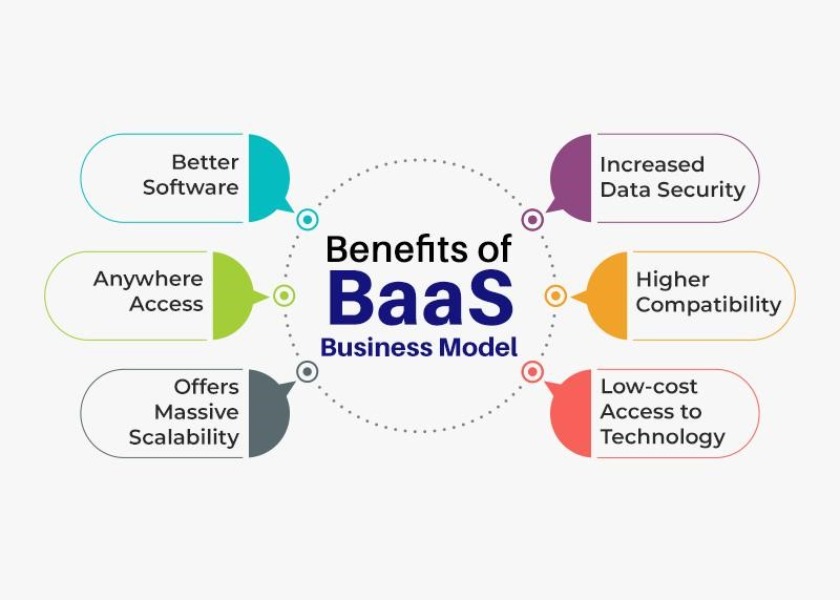
The global Blockchain-as-a-Service market is expected to reach USD 982.8 billion by 2025.
In the post-pandemic era, digital and networking systems are going to be managed and operated in a whole new way with the rise of blockchain technology. IT leaders Amazon, Microsoft, and IBM have already developed and commercialized their blockchain-as-a-service platforms. For many companies, this technology of trust will allow for the use of “smart contract” tools to automate manual compliance and claim processes.
The blockchain market is gaining traction with SMEs in the IT sector since the technology is flexible and supportive of secure and cost-effective transactions. With efficient blockchain-as-a-service platforms, IT companies will be able to provide security and online authentication for personal identities.
2. Hybrid cloud platform capabilities: a USD 1 trillion market opportunity
In July this year, DXC Technology announced the launch of a new pay-per-use cloud consumption service model as part of its hybrid cloud innovation, expanding upon its partnerships with VMware and Amazon Web Services. As flexibility and agility continue to be prized in the enterprise environment, more than three-quarters of medium-sized and large IT companies are shifting their business strategy to hybrid cloud computing.
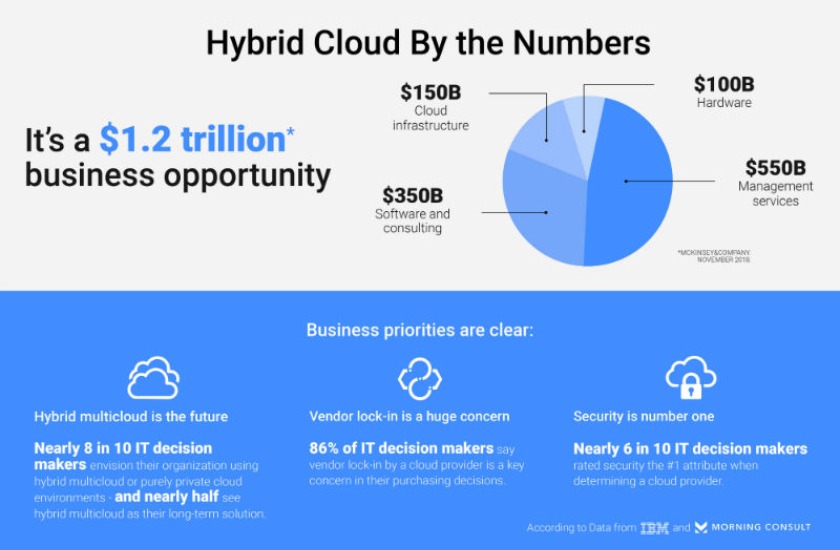
In 2022, hybrid cloud will provide an opportunity to streamline cloud management.
IT companies are eyeing hybrid cloud with the intent to move workloads among private and public clouds. This will give clients greater adaptability with their registering needs. Also, utilizing hybrid cloud will effectively eliminate data silos and reduce cost overruns for organizations of every size. This facilitates the interaction between different cloud environments for optimum data efficiency.
By 2023, the hybrid cloud computing market is expected to reach USD 97.64 billion thanks to its various advantages. IBM is already investing in platform capabilities, including security and industry-specific hybrid clouds alongside IT giants like Microsoft and Amazon. On the other hand, SMEs continue to extensively adopt hybrid cloud solutions. Mid-tier disruptors like HCL, DXC Technology, and VMWare are now investing heavily in this innovation.
3. Diverse talent pools: glocalization of workforce
There is no doubt that the pandemic has had profound effects on our work lives and workplaces. It has also had an impact on the push to put diversity, equity, and inclusion (DEI) at the forefront of IT organizations. COVID-19 has exacerbated the already uneven work equity gaps. Women’s jobs are 1.8 times more vulnerable to this crisis than men’s jobs. Women account for only 39% of global employment but more than 54% of overall job losses.
Meanwhile, it is important to take note here that corporations identified as more diverse and inclusive are 35% more likely to outperform their competitors. To be competitive in recruiting, companies need to prioritize DEI. Data clearly shows that DEI is a priority for job seekers. Moreover, 50% of current employees want their company to commit more energy toward promoting diversity.
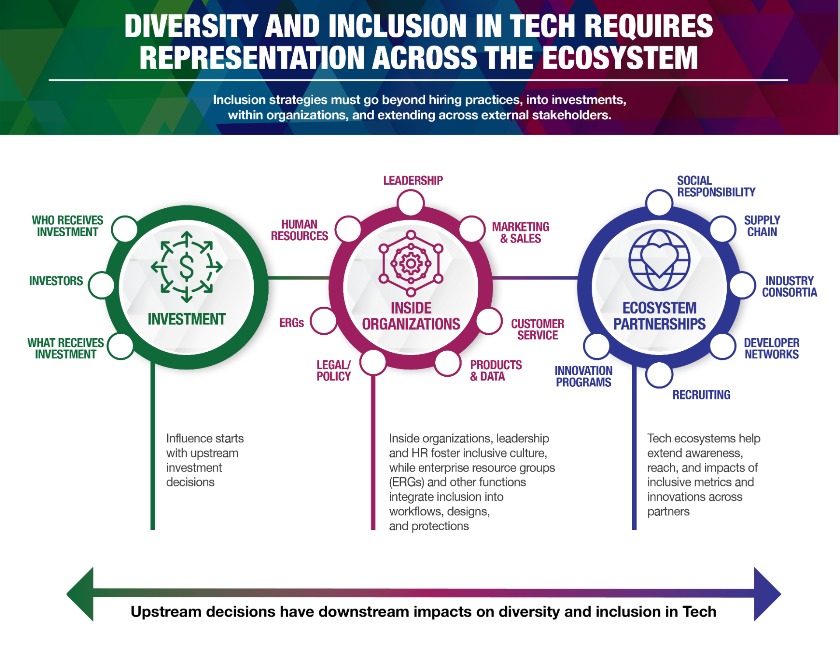
Industry-leading plurality will lead to industry-leading growth.
IT major Wipro announced that its goal in 2022 is to build diverse talent at scale. The organization is planning to employ an ambitious program across front-end, domain, and technology areas to scale talent and build leadership diversity. Similarly, Cognizant is extending its Global Delivery Network with a geographically diverse footprint to complement its major hub in India. In fact, the company is looking at ensuring greater robustness and resilience in its capabilities, automating its distributed work models, and providing more access to local talent.
Eventually, protecting human dignity and empowering employees will take center stage for IT companies. There will be an increased focus on creating an agile workforce and building young leaders across technical and non-technical areas. Moving forward, companies like Infosys and TCS have stated their intention to push organic growth. They plan to do this by focusing on people, not just jobs, and by nurturing agility, adaptability, and re-skilling.
What is your next move? Is your company prepared to navigate technological disruption and find a competitive edge in the post-pandemic era? Act now.
4. Net Zero business: From trend to revolution of the century
For IT companies, purpose-driven goals will lead to massive opportunities. Moreover, 79% of IT leaders suggest that their organization’s growth will be determined by their ability to shift to a clean technology economy. What started as a trending conversation in the early 2010s is now driving a profound shift in stakeholder expectations. For IT business growth strategy, ESG is more important than ever before. Moreover, the global pandemic has created significant momentum in this direction.
In 2022, HCL intends to focus on accelerating actions on the environmental and social responsibility agendas. Furthermore, Infosys plans to take a holistic approach to ESG, promoting sustainability, art, and culture, and education, restoring heritage sites, and focusing on preventive healthcare. Meanwhile, Tech Mahindra claims that net-zero will be the new business imperative. The company will follow the resurgence of net-zero, renewable, and circular business models.
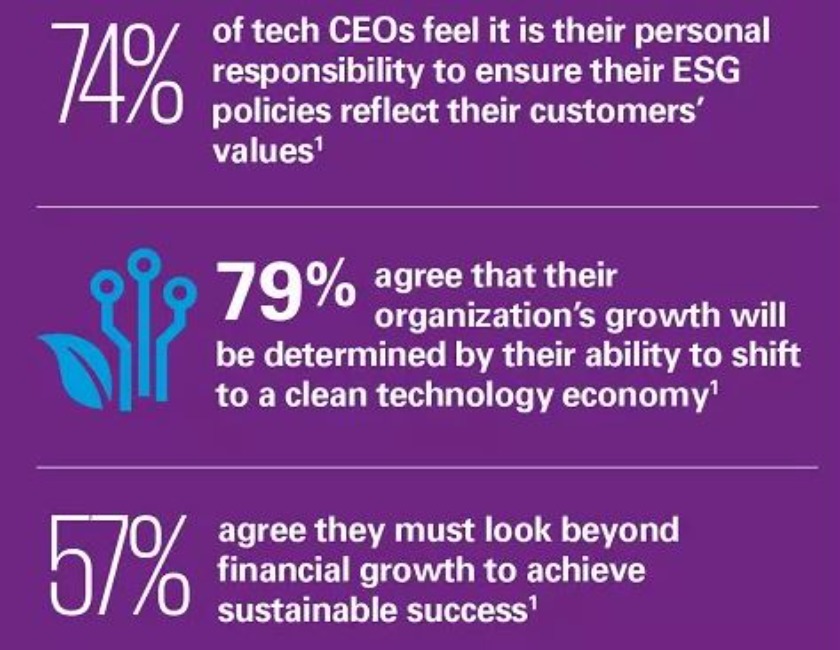
COVID-19 has acted as a wake-up call to climate change and resource scarcity.
Furthermore, global IT companies Adobe, TCS, Salesforce, and Microsoft have already earned the top rating on ESG indices. Fujitsu is focusing on its smart and sustainable manufacturing initiatives and Capgemini is aiming to become a net-zero business by 2030.
IT companies in this decade have a unique opportunity to reorient their business toward a value creation ecosystem. Their value propositions will likely emerge from growth areas such as environmental sustainability, employee engagement, external partnerships, and broader societal impact.
5. Cybersecurity amidst digital transformation: Turning the pandemic crisis into opportunity
As enterprises adopt hybrid working cultures and cloud infrastructure, the function of information and cyber security is growing increasingly important. To illustrate, 71% of security professionals report increased security threats or attacks since the COVID-19 outbreak. 51% of companies experienced more phishing attacks due to employees working remotely.
As IT companies strive to succeed in the new normal, the pace of digital transformation will accelerate like never before. In this pursuit, protecting data and sensitive information will not just be a best practice but a business driver. The IT industry’s next move should be to build cyber security into vendor activities, operation processes, and customer relationships.
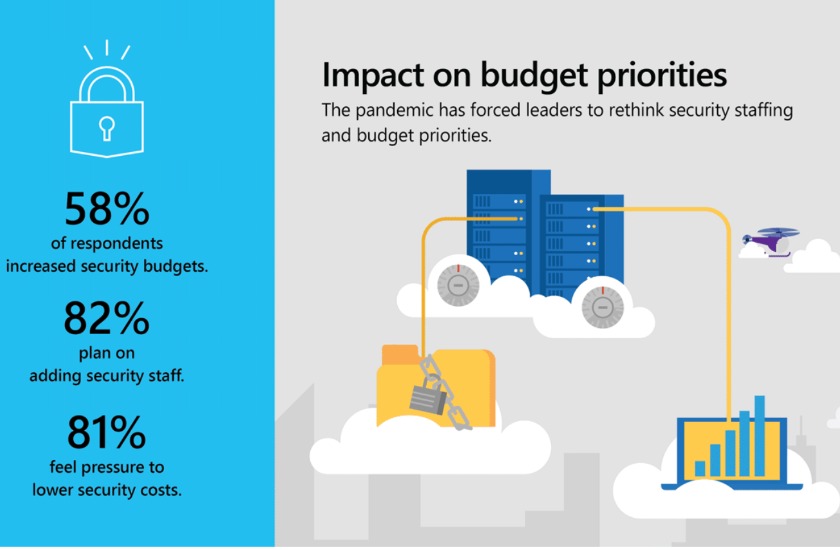
With the increase in cyberattacks, organizations continue to spend more money on security.
Organizations are no longer confined to the four walls of an office. Hence, having an integrated approach to cyber security that covers on-premise and cloud assets is essential. IT companies such as Accenture and Intuit are planning to explore end-to-end cybersecurity services as part of their post-pandemic business goals. These include advanced cyber defense, applied cybersecurity solutions, and managed security operations.
The worldwide spending on information security (a subset of the broader cybersecurity market) products and services is expected to reach USD 170.4 million in 2022. The post-pandemic opportunity for IT companies lies in safeguarding what matters the most – employee, business, and consumer data. Amid the ransomware epidemic and deployment of billions of under-protected Internet of Things (IoT) devices, this is the need of the hour.
Moving forward
Businesses want to self-disrupt before competitors disrupt them. In fact, 60% of IT leaders say that COVID-19 has impacted how they approach change management and accelerate automation in their organizations. As the world looks beyond the COVID-19 crisis, technology businesses will need to pivot faster than the speed of change to take advantage of the aforementioned growth opportunities.
“Companies that are heavily investing in their digital roadmap, whether it is adopting the cloud or liberating intelligence or automating and embracing risk, will be leaders in the future marketplace.”
– Raman Venkatraman, Global Head, HiTech & Professional Services Industry Unit, TCS
Winning companies will reinvent themselves to overpower further crises with the knowledge of the relevant market, technology, and innovation opportunities. So, what is your next move? Is your business prepared to navigate technological disruption and find a competitive edge in the post-pandemic era? With Netscribes’ technology and innovation research solutions, you can stay prepared for the next wave of technology requirements and the business landscape. To learn more, get in touch with us.






